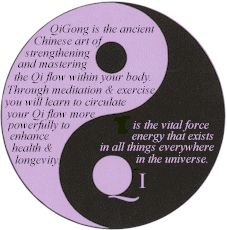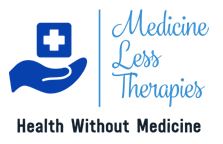Qigong:
- Qigong, which is sometimes spelled Chi-Kung (and pronounced chee-gung), is the study and practice of cultivating vital life-force through various techniques, including:
- Breathing techniques.
- Postures.
- Meditations.
- Guided imagery.
- Qi means “breath” or “air” and is considered the “vital-life-force” or “life-force energy.”

- Qigong practitioners believe that this vital-life-force penetrates and permeates everything in the universe.
- It corresponds to the Greek “pneuma,” the Sanskrit “prana,” or the Western medical conception of “bioelectricity.”
- Gong means “work” or “effort” and is the commitment an individual puts into any practice or skill that requires time, patience, and repetition to perfect.
- Through study, the individual aims to develop the ability to manipulate Qi in order to promote self-healing, prevent disease, and increase longevity.
Benefits of Qigong:
- All living organisms give off a bioelectric field.
- It is believed that a Qigong healer can detect these fields, as well as their imbalances.
- The goal of Qigong is to correct the imbalances that have accumulated throughout a person’s lifetime.
- Imbalances occur from deep-seated emotions (stress, anger, anxiety, depression, grief, etc.), trauma or injury, improper diet, excessive sexual activity, lack of exercise, etc.
- Imbalances may also be acquired from our parents (both constitutional and emotional).

- Qigong practitioners believe the Qi that course through our entire being must flow properly, like a river.
- If there is a block, Qi becomes stagnant and prevents other parts of the body from being nourished.
- If the Qi flows too rapidly, it causes degeneration or exhaustion of the internal organs.
- The practice of Qigong helps to balance these energies: filling deficiencies and removing excess.
- Practicing Qigong and receiving Qigong healing activates acupuncture points, meridians, and organ systems, according to Traditional Chinese Medicine. Therefore, practicing and receiving Qigong is similar to a powerful acupuncture treatment.
- Qigong also likely works in the same manner as other physical exercise to relieve emotional stress.
Origins of Qigong:
- Qigong is a special application of Qigong that is used to help people with chronic diseases and injuries.
- Medical Qigong programs are typically based on the principles of Chinese acupuncture and the body’s meridian system.
- Typically medical Qigong is used in conjunction with other forms of Chinese medicine, such as acupuncture, herbs and ordinary massage.

- In the West, it is often used as complementary therapy to Western medical practices.
Medical Qigong is used in the following ways:
- To heal and regenerate the body in various ways
- To target specific illnesses with specific Qigong sets
- To create prescriptions that changes over time depending on the progress of the individual
- As a form of treatment by therapists who practice Qigong
tui na to move and rebalance energy in a clients body
